



number_format(number, number of decimal places to display, decimal places character, thousands marker)
<?php
echo "Display symbol every three digits and specify the number of decimal places<br />";
$num = 4567896213.989;
echo "The number of destinations is {$num}. <br />";
echo "1. Comma every three digits : ".number_format($num) . "<br />";
echo "2. Comma and decimal point every three digits : " .number_format($num,"2",".",","). "<br />";
echo "4. @ sign and decimal point every three digits # sign : ".number_format($num,"2","#","@");
?>

When only number_format($num) is used, it is separated by commas every 3 digits and the decimals disappear.
number_format($num, "2", ".", ",") Rounds to the second decimal place, and the third argument is the character used in character reality to separate the decimal points.
Put it.
The fourth is a marker to distinguish every three digits.
<?php
echo "Replace -23 with an integer<br />";
$a = -23;
$b = abs($a);
echo "The abs function was used and changed like this {$b}";
?>

Increasing the number of decimal places, abandoned, to round functions:
decimal rounding functions: ceil()
remove the decimal place: floor()
decimal places specified: round()
haebomyeon implemented as the source,
<?php
echo "<b> round, round, round off </b> <br />";
$a = 88.123456;
echo "---------------------------------------- <br />";
echo "Let's do the decimal with the variable \$a = 88.123456 <br />";
echo "1. Unconditional raising .........".ceil($a)."<br /><br />";
echo "2. Unconditionally discarded .........".floor($a)."<br /><br />";
echo "3. Round less than 3 decimal places .....".round($a,3)."<br />";
?>
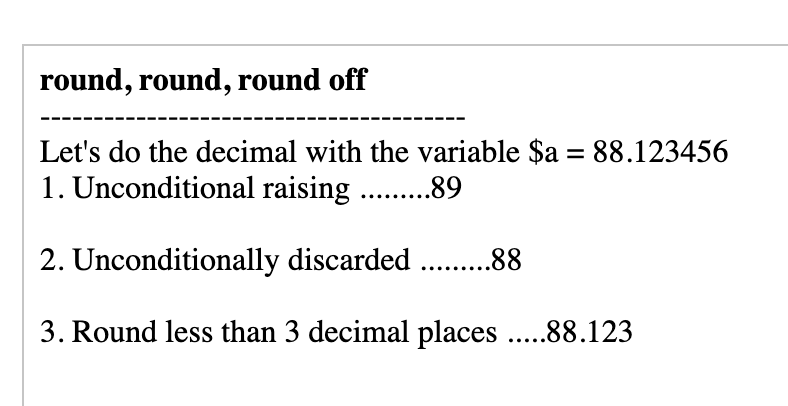
pow(calculate, exponential)
<?php
echo "Exponential power of variable a=3, b=5 <br /><br />";
$a = 3;
$b = 5;
$abpow = pow($a, $b);
echo "The $b Exponential of $a is {$abpow}.";
?>

<?php
echo "Get the square root <br />";
$a = 144;
$asqrt = sqrt($a);
echo "The square root of $a is {$asqrt}.<br />";
?>
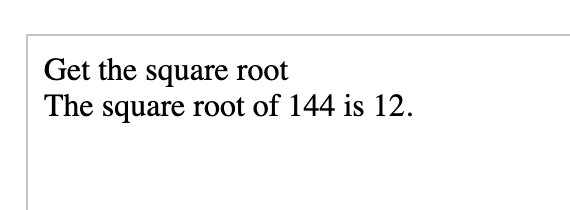
Log(number, base) calculates the natural logarithm of the number entered, and log10 calculates the base 10.
log(number, base)
log10(number)
<?php
echo "log() and log10() functions<br />";
$a = 23;
$val1 = log($a,5);
$val2 = log10(23);
echo "Calculate log when variable \$a = 23 <br />";
echo "val1 = {$val1} <br />";
echo "val2 = {$val2} <br />";
?>
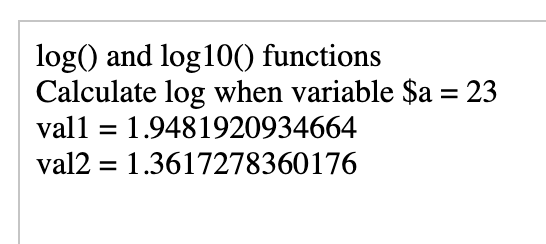
It's called Pi, so I remember that my propressor said Choco Pie(korean cookie) pi should be seen as π ㅡㅡ^.
the value of pi is 3.141592....
M_PI when used as a constant
<?php
echo "Width and circumference of circle using pi() function <br />";
$a = 10;
$val1 = $a * $a * pi(); // or replace pow($a, 2) * pi()
$val2 = $a * 2 * M_PI;
echo "When the radius of the circle \$a = {$a}<br />";
echo "Width of the circle ... {$val1} <br />";
echo "Circle of circle ... {$val2} <br />";
?>
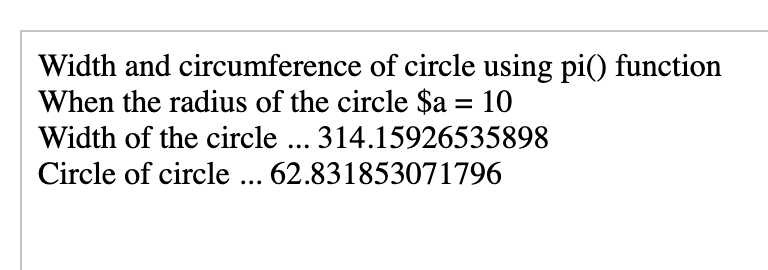
dechex = convert decimal to hexadecimal
hexdec = translation of hexadecimal to decimal
<?php
echo "dechex() , hexdec()<br />";
$a = 342;
$b = ad;
$val1 = dechex($a);
$val2 = hexdec($b);
echo "in decimal {$a}, in hexadecimal {$b} <br />";
echo "1. Convert decimal 342 to hexadecimal ... {$val1} <br />";
echo "2. Convert hexadecimal ad to decimal ... {$val2} <br />";
?>

max(argument1, argument2, argument3 ....... argument n)
min(argument1, argument2, argument3 ....... argument n)
<?php
echo "max min <br />";
$a = max(12,23,456,3);
$b = min(12,23,456,3);
echo "the value of maximum is {$a}<br />";
echo "the value of minimum is {$b} <br />";
?>
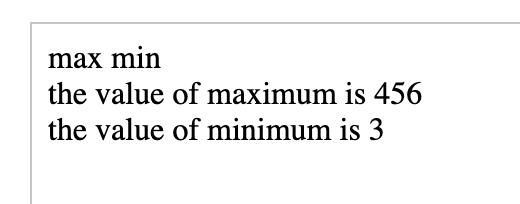
Characters as well as numbers can be used. However, strings are treated as 0, and if there is the same string, both are 0, and the leftmost value is the maximum value.
In contrast, the minimum value is the right value of the same character. Then understand the source below.
<?php
echo "max min <br />";
$a = max('a','z');
$b = min('a','z');
echo " the value of maximum is {$a} <br />";
echo " the value of minimum is {$b} <br />";
?>
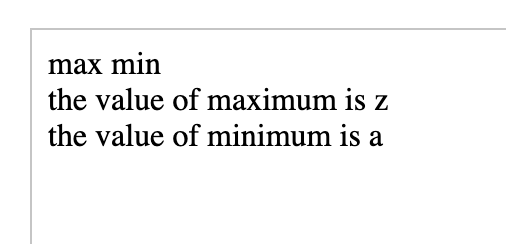
True and false are also possible.
True evaluates to the maximum value and returns 1;
false evaluates to the minimum value and returns blanks.
If you understand the source below ...
<?php
echo "max min <br />";
$a = max(true,false);
$b = min(true,false);
echo " the value of maximum is $a <br />";
echo " the value of minimum is $b <br />";
?>
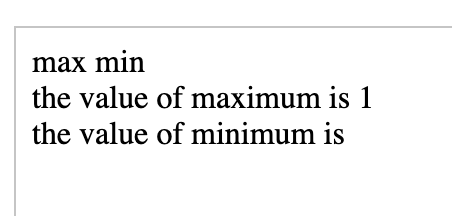
Returns a random integer value.
If not set, returns a random number up to 32768.
To specify a specific range, set the min value max.
rand and mt_rand have the same function.
But mt_rand runs faster and generates progressive random numbers.
But how far is it going to be ;;;
Usage is
rand()
rand(minimum, maximum)
mt_rand()
mt_rand(minimum, maximum)
<?php
echo "rand()<br />";
$a = rand();
echo "When using the rand() function ....{$a} <br />";
$b = rand(1,10);
echo "When using the rand(1,10) function ... {$b} <br />";
$c = mt_rand();
echo "When using the mt_rand() function ... {$c} <br />";
$d = mt_rand(1,10);
echo "When using the mt_rand(1,10) function ... {$d} <br />";
?>

Array value sorting function: sort()
A function that sorts
the values declared in the array from small to big or sorts them alphabetically and returns them as array variables.
For example, change array(3,4,6,2,8,5) from small to large.
Usage
sort(array variable, array method)
Three methods of array
sort_regualr: General comparison
sort_numeric: Numeric comparison
sort_string: Comparison by string
<?php
echo "function sort() <br />";
$a = array(23,9,15);
echo "before using sort() <br />";
for($c = 0; $c <= 2; $c++){
echo "$a[$c] <br />";
}
echo "<br />";
sort($a);
echo "after using sort() function <br />";
for($c = 0;$c <= 2; $c++){
echo " $a[$c] <br />";
}
?>
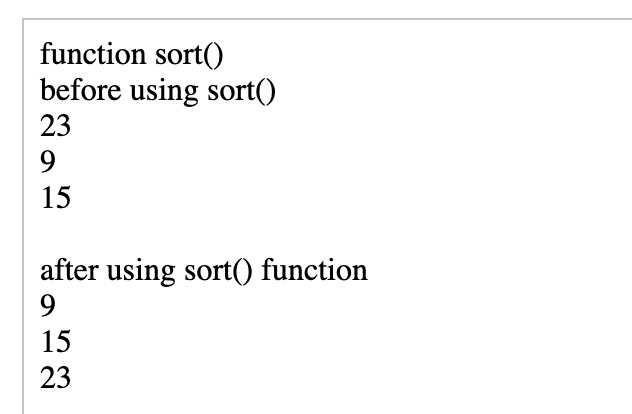
Function to get the number of arrays: count(), sizeof()
count_recursive is useful for counting the number of arrays.
count(array variable, [count_recursive])
<?php
echo "Use count(), size() function to count number of arrays <br />";
$a = array("MacBook Pro 16","MacPro","iPad Pro","iPhone Pro");
$list = count($a);
echo "the number of array \$a is {$list}";
?>

This concludes the function tutorial and the next section goes to using mysql.
After the mysql course, we will move on to php sessions and cookies, and then to php and mysql linkage.
Thank you for visiting. If you have any inquiry or explanation of mistakes, please use the comments below.
ALL COMMENTS 0
Sort by
